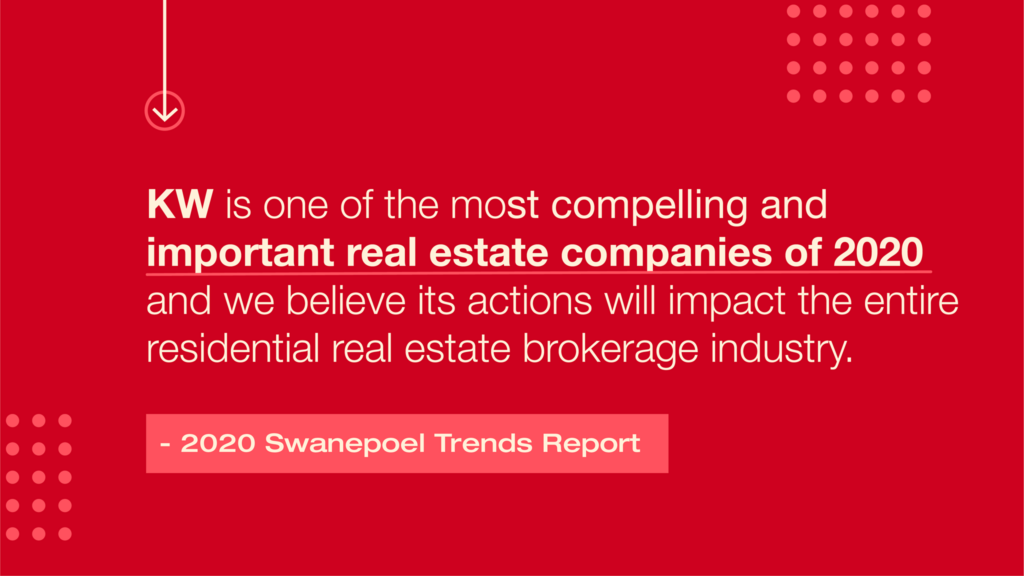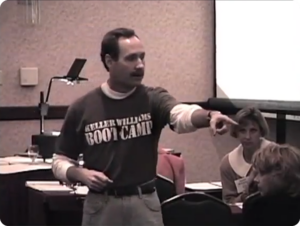Nearly two years after achieving one of the most stunning David and Goliath stories in real estate history Keller Williams continues to surge past industry giants like RE/MAX, Coldwell Banker, and Berkshire Hathaway HomeServices. In January 2018, KW announced its status as the number one real estate franchise in agent count, closed units, and closed sales volume in the United States*. What’s happened since has been nothing short of incredible.
Driven by Keller Williams’ agents commitment to excellence, the company:
- Closed more than 1 million units, generating more than $332 billion in sales revenue in the United States and Canada in 2018.
- Had 174 brokerages that appeared on the REAL Trends 500, representing 34.8 percent of the top 500 brokerages for 2018.
- Was named a Top Workplace for Women by Forbes and a Top Workplace for Veterans by Indeed in 2019.
- Ranked No. 1 in the real estate and urban development category on Fast Company’s prestigious annual list of the World’s Most Innovative Companies for 2019.
- Was named a top 2020 trend in the Swanepoel Trends Report. The report takes an objective look at what prompted this disruption.

While each achievement is notable, the real story of Keller Williams’ success begins several decades earlier.
The Beginning
Founded in 1983 and based in Austin, Texas, Keller Williams’ first agent, Gary Gentry, wrote the first offer for $55,000 and the starting roster of 32 agents went on to close $28 million in volume. After an auspicious start, the young company’s agents became prime recruits and a few top producers left to work with competitors, leaving the balance of the initial team to struggle in a tough Texas economy.
“It was a difficult time,” Gentry reflects. “But in retrospect it was a godsend, because if you learn how to survive and thrive in hard times, then when things change, you are going to do exceptionally well and you’ve been hardened and strengthened through the process. With the kind of training support that Gary [Keller] and Joe [Williams] gave us, we were constantly learning how to adapt to a different market. On a daily basis, we would discuss what the market was doing and what we needed to do to grow our businesses. A lot of our policy and culture was developed during this time.”
 In 1986, Keller convened the first Associate Leadership Council (ALC) to reinvent Keller Williams from a traditional real estate company into one that would disrupt the industry. He shared his vision to create a new type of real estate company, where a world-class culture focused on the prosperity and well-being of its people would become an environment no agent or team ever wanted or needed to leave.
In 1986, Keller convened the first Associate Leadership Council (ALC) to reinvent Keller Williams from a traditional real estate company into one that would disrupt the industry. He shared his vision to create a new type of real estate company, where a world-class culture focused on the prosperity and well-being of its people would become an environment no agent or team ever wanted or needed to leave.
The ALC’s subsequent sessions were the basis of the company’s core belief system, the WI4C2TS. They also developed the profit share program, which treats associates who help the company grow as true business partners. Driven by the philosophy that success lies in shared prosperity, market centers share roughly half of their monthly profit with their team. Since its inception, the profit share program has distributed more than $1 billion to associates who have helped the company grow.
Keller and his colleagues were so focused on helping agents succeed, that in 2002 they brought a team of mega agents together to answer the question, “What would it take to net a million dollars in personal income?” Their brainstorm resulted in models that would later serve as the basis for Keller’s first book, The Millionaire Real Estate Agent, a national bestseller and a catalyst for the company’s growth.
“With the kind of training support that Gary [Keller] and Joe [Williams] gave us, we were constantly learning how to adapt to a different market.”
By 2006, through the leadership of executives like Mo Anderson and Mary Tennant, Keller Williams was the fifth-largest real estate franchise in the United States, and in 2011, the company surpassed Century 21 as the number 2 real estate franchise in the country.
As Keller and his leadership team examined their markets, they saw a unique trend emerge among the most successful teams. The strategy was simple: Hold powerful conversations with market center leadership centered on the core activities that would generate results. Through coaching, healthy business practices flourished at the local level and agent production grew. The system was soon implemented in other market centers and regions across the country with the model in hand.
With healthy business practices being implemented at the local level, agent production grew. In 2013, the company was the top real estate franchise by agent count in North America, and in 2014, more associates called Keller Williams home than any other real estate franchise in the world.
KW Evolves to Tech
At the 2017 Family Reunion event in February, the next phase of Keller Williams’ evolution was announced: a commitment to developing the real estate platform that buyers and sellers prefer. As a result of its growth and a strong vision cast by Keller, the company planned to invest $1 billion in technology.

“World-class technology companies need to own their product vision, they can’t rent it. We can’t outsource our road map and vision because no one cares more about what you need to be successful, than we do,” said Josh Team, former chief innovation officer turned president in 2018. “Our observation is the number one challenge an agent faces is the number of independent, disconnected technologies.”
Agents reportedly use up to a dozen software products and systems to do their job. Given this knowledge, Keller Williams strengthened their resolve to provide the kind of resources agents need and want to use.
What was accomplished in the next two years in Labs set the stage for success:
The Keller Cloud Debuts
Both cloud service ecosystem and real estate anomaly, the Keller Cloud contains the data Keller Williams agents have amassed since day one. With the end goal of serving the customer a state of the art experience, the Keller Cloud’s mission is to provide real-time information exchange, in-the-moment data analysis, and unparalleled efficiency for both the agent and the customer.
Kelle is Born
By liberally championing their “Fail Fast” philosophy, the virtual sidekick ad AI-powered assistant, Kelle was born. From finding market data to growing an agent’s referral network and expertly navigating other Keller Cloud technologies, Kelle gets it done.
“World-class technology companies need to own their product vision, they can’t rent it.”
As Kelle churned and learned every day and showed agents her true value, it became clear to the company that they had something interesting to offer. The team turned a corner after entering and winning the NAR Hackathon for Kelle’s cutting edge ability to leverage AI and machine learning to serve the industry. Now, Keller Williams had license to unleash the rest of their power.
Command Arrives
Fast forward to Family Reunion 2019: Command makes its debut, bringing a multi-faceted, customizable platform available for immediate use by Keller Williams’ sea of agents. Powered by the Keller Cloud and supplemented with Kelle’s AI and mobile efficiencies, Command positions KW to disrupt the industry again.
More importantly, it is the cornerstone of an end-to-end consumer experience, which no agent or company has been able to achieve, but Keller Williams is prepping to release.

With these innovations, Keller Williams not only raises the bar in its commitment to providing the foremost resources agents need to elevate their business; it redefines the way real estate is done.
“We’re making huge strides in our journey to deliver the end-to-end platform that our agents need to provide the personalized, data-enriched experience their clients expect,” said Team.
This is crucial as companies pour billions of dollars into technology aimed at disinter-mediating the agent from the consumer. Yet, by its size alone, Keller Williams has the power of collective data and the magnitude to provide its agents with consumer insights no one can match. With this remarkable leverage, the company keeps agents at the center of the transaction, allowing them to build real estate businesses without limits or boundaries.





